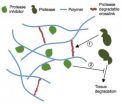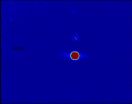(Press-News.org) WASHINGTON (March 31, 2014) — Gastric bypass and sleeve gastrectomy – two of the most commonly used bariatric surgeries – are more effective than intensive medical therapy alone when it comes to managing uncontrolled type 2 diabetes in overweight or obese patients after three years, according to research presented at the American College of Cardiology's 63rd Annual Scientific Session.
STAMPEDE is the largest randomized controlled trial with one of the longest follow-ups to compare the effect of these two procedures to intensive medical therapy in helping patients achieve glycemic control, defined in this study as a three-month average blood glucose level of 6 percent or lower – a more aggressive target than the American Diabetes Association recommendation of 7 percent. At the three-year follow up, only 5 percent of patients in the medical therapy group met this primary endpoint compared with 37.5 percent of gastric bypass and 24.5 percent of sleeve gastrectomy patients. Surgical patients also had a significant improvement in key cardiovascular risk factors including body mass index, weight control, triglycerides and high-density lipoprotein cholesterol compared to those receiving medical therapy alone.
"Both surgical options maintain their supremacy over standard intensive medical therapy at the three-year mark," said Philip Schauer, M.D., professor of surgery, director of the Bariatric and Metabolic Institute, Cleveland Clinic, and lead investigator of the study. "There is this notion that if we keep adding medications and pushing patients to lose weight on their own, they will eventually achieve the same type of results as those undergoing surgery, but that wasn't the case here."
While the medical group showed an initial improvement in glycemic control within the first year, they were almost back to baseline by year three. "Their [blood glucose level] went from 9.5 at the start of the study and dropped as low as 7.5 and then back up to 8.4 percent," he said. In contrast, the surgical groups were able to maintain a lower glucose level with an average 2.5 percent reduction (9.3 at baseline and 6.7 and 7.0 for gastric bypass and sleeve gastrectomy at year three).
A total of 150 patients, age 41 to 57, were randomly assigned to one of three treatment groups: intensive medical therapy only, which includes a combination of counseling, lifestyle changes and medications, medical therapy plus Roux-en-Y gastric bypass, or medical therapy plus sleeve gastrectomy. Nearly all patients, 91.3 percent, completed 36 months of follow up. At the start of the trial, the average patient had an average blood glucose level of 9.2 percent, was living with uncontrolled diabetes for eight or more years and was taking three or more anti-diabetic medications and three or more cardiovascular medications. All patients had some degree of obesity. The sample was 66 percent female.
After three years, weight loss was five to six times greater for patients who underwent gastric bypass or sleeve gastrectomy on average compared with those in the intensive medical therapy group. On average the gastric bypass group lost 24 percent of their body weight, sleeve gastrectomy patients lost 21percent of their weight, and those on medical therapy alone lost 4 percent.
Quality of life measures were evaluated using a validated questionnaire and were significantly improved across multiple domains in both of the surgical groups. There was no improvement among those in the intensive medical therapy group.
Reliance on cardiovascular and glucose-lowering medications was drastically reduced in the surgery groups. At three years, 5 percent to 10 percent of these patients were using insulin compared to 55 percent of those in the medical therapy group.
New data considered kidney function as measured by the amount of albumin in the urine – a marker of kidney damage due to diabetes. Albumin was significantly lower in the gastric bypass group at year three, a trend that was not seen in either of the other groups.
Even those patients who are not severely obese, those with a body mass index of 27 to 35, appear to benefit from surgery in much the same way as those with a higher body mass index, a finding that Schauer hopes will encourage insurance companies to lower the threshold for covering such procedures.
Sleeve gastrectomy involves removing part of the stomach to reduce its volume by 75 to 80 percent; gastric bypass involves two operations, the first to reduce the stomach to 2 to 3 percent of its usual volume (going from the size of a football to a golf ball when expanded) and the second to connect the new gastric pouch directly into the intestine to bypass the stomach.
Roughly 80 percent of the 23 million American adults living with type 2 diabetes are overweight or obese, so these findings may apply to a significant percentage of patients with diabetes, according to researchers. People with uncontrolled diabetes have a much higher risk of cardiovascular complications, including heart attack, stroke and the development of secondary complications like neuropathy, retinopathy and amputation.
"Three years ago, top endocrinologists were curious about these surgeries, but due to the lack of randomized controlled trials and data, were reluctant to include it as a legitimate therapy," Schauer said. "But now the evidence is mounting and we see the benefits of surgery over medical therapy for these patients."
Bariatric surgery is not without risks and can cause complications such as bleeding, infection or blood clots. However, researchers report no major late surgical complications. The most common issues were reported at 12 months and included short-term dehydration, bleeding and one leak. Four out of 100 surgical patients needed operative intervention to manage complications occurring within the first year.
Schauer and his team will conduct long-term follow-up of these patients. Multicenter studies are needed to evaluate the effect of surgery and medical therapy on clinical outcomes such as heart attack, stroke, renal failure and blindness. Several studies have been published since STAMPEDE's one-year results and show similar findings.
INFORMATION:
This study was funded by Ethicon Endo-Surgery, Inc., a subsidiary of Johnson & Johnson. Dr. Schauer is a consultant with Ethicon.
This study will be simultaneously published online in the New England Journal of Medicine at the time of presentation.
The ACC's Annual Scientific Session brings together cardiologists and cardiovascular specialists from around the world each year to share the newest discoveries in treatment and prevention. Follow @ACCMediaCenter and #ACC14 for the latest news from the meeting.
The American College of Cardiology is a nonprofit medical society comprised of 47,000 physicians, surgeons, nurses, physician assistants, pharmacists and practice managers. The College is dedicated to transforming cardiovascular care, improving heart health and advancing quality improvement, patient-centered care, payment innovation and professionalism. The ACC also leads the formulation of important cardiovascular health policy, standards and guidelines. It bestows credentials upon cardiovascular specialists, provides professional education, supports and disseminates cardiovascular research, and operates national registries to measure and promote quality care. For more information, visit CardioSource.org.
Bariatric surgery beats medical therapy alone for managing diabetes
Glycemic control, weight loss, medication needs remain improved at 3 years
2014-03-31
ELSE PRESS RELEASES FROM THIS DATE:
'Ivory tower' bucking social media
2014-03-31
EAST LANSING, Mich. — University scholars are largely resisting the use of social media to circulate their scientific findings and engage their tech-savvy students, a Michigan State University researcher argues in a new paper.
While social media is widely used in fields such as journalism and business – not just to push a product but also to engage in open dialogue with readers and clients – it has failed to take hold in academia's so-called ivory tower. This is troubling given that universities in the United States and Europe are trying to increase access to publicly ...
Can vitamin A turn back the clock on breast cancer?
2014-03-31
(PHILADELPHIA) – A derivative of vitamin A, known as retinoic acid, found abundantly in sweet potato and carrots, helps turn pre-cancer cells back to normal healthy breast cells, according to research published this month in the International Journal of Oncology. The research could help explain why some clinical studies have been unable to see a benefit of vitamin A on cancer: the vitamin doesn't appear to change the course of full-blown cancer, only pre-cancerous cells, and only works at a very narrow dose.
Because cells undergo many changes before they become fully ...
Excessive hospital occupancy levels result in avoidable mortality
2014-03-31
Once a hospital reaches a certain occupancy level, the quality of care it provides deteriorates, increasing the risk of mortality of critically ill patients. What is worrying is that this safety 'tipping point' is reached at occupancy levels that are below 100%. The findings are reported by a team of researchers led by Ludwig Kuntz, Professor of Health Management at the University of Cologne. Their paper (Stress on the Ward: Evidence of Safety Tipping Points in Hospitals) is to appear shortly in the international journal Management Science.
For the purposes of their study, ...
Anesthetic technique important to prevent damage to brain
2014-03-31
Researchers at the University of Adelaide have discovered that a commonly used anesthetic technique to reduce the blood pressure of patients undergoing surgery could increase the risk of starving the brain of oxygen.
Reducing blood pressure is important in a wide range of surgeries – such as sinus, shoulder, back and brain operations – and is especially useful for improving visibility for surgeons, by helping to remove excess blood from the site being operated on.
There are many different techniques used to lower patients' blood pressure for surgery – one of them is ...
Minneapolis Cardiology Fellow named an ACCF Young Investigators Awards finalist
2014-03-31
MINNEAPOLIS, MN – March 31, 2014 – Minneapolis Heart Institute Chief Cardiology Fellow Ankur Kalra, MD has been named as a finalist for the 2014 ACCF Young Investigators Awards. Kalra's research, funded by the Minneapolis Heart Institute Foundation (MHIF), supports the ongoing quest to better identify, with noninvasive tools, which heart attack survivors are at greatest risk for sudden cardiac death, and therefore may benefit from ICD (implantable cardioverter defibrillator) therapy. Kalra will present his research at the American College of Cardiology (ACC) meeting in ...
Can gratitude reduce costly impatience?
2014-03-31
The human mind tends to devalue future rewards compared to immediate ones – a phenomenon that often leads to favoring immediate gratification over long-term wellbeing. As a consequence, patience has long been recognized to be a virtue. And indeed, the inability to resist temptation underlies a host of problems ranging from credit card debt and inadequate savings to unhealthy eating and drug addiction.
The prevailing view for reducing costly impatience has emphasized the use of willpower. Emotions were to be tamped down in order to avoid irrational impulses for immediate ...
Periodic puns: Chemistry jokes just in time for April Fools' Day (video)
2014-03-31
WASHINGTON, March 31, 2014 — It's almost April Fools' Day, and the American Chemical Society's (ACS') Reactions video series is celebrating with an episode featuring our favorite chemistry jokes. Which two elements look cute together? Why is father water concerned about his "iced out" son? What do you get when you combine sulfur, tungsten and silver? Get all the punchlines in the latest Reactions episode, available at: http://youtu.be/C5RZRkhk0OM.
Subscribe to the series at Reactions YouTube, and follow us on Twitter @ACSreactions.
INFORMATION:
The American Chemical ...
New Penn-designed gel allows for targeted therapy after heart attack
2014-03-31
Combatting the tissue degrading enzymes that cause lasting damage following a heart attack is tricky. Each patient responds to a heart attack differently and damage can vary from one part of the heart muscle to another, but existing treatments can't be fine-tuned to deal with this variation.
University of Pennsylvania researchers have developed a way to address this problem via a material that can be applied directly to the damaged heart tissue. The potentially dangerous enzymes break down this gel-like material, releasing enzyme inhibitors contained within. This responsive, ...
New Zealand physicists split and collide ultracold atom clouds
2014-03-31
VIDEO:
Physicists from New Zealands' University of Otago have pushed the frontiers of quantum technology by developing a steerable 'optical tweezers' unit that uses intense laser beams to precisely split minute...
Click here for more information.
Physicists at New Zealand's University of Otago have pushed the frontiers of quantum technology by developing a steerable 'optical tweezers' unit that uses intense laser beams to precisely split minute clouds of ultracold atoms and to ...
Childhood virus may increase type 1 diabetes risk
2014-03-31
The study, published today in PLOS Pathogens, explored the ways the rotavirus infection contributes to autoimmune disease in mice, and researchers believe the breakthrough could be relevant to human infection with rotavirus.
The research found that it may be the "bystander effect" that causes the rotavirus infection to accelerate the onset of type 1 diabetes.
The "bystander effect" suggests that the virus provokes a strong activation of the immune system, which then spills over, allowing the immune system to attack not only the viral intruder but some of the body's ...
LAST 30 PRESS RELEASES:
$3 million NIH grant funds national study of Medicare Advantage’s benefit expansion into social supports
Amplified Sciences achieves CAP accreditation for cutting-edge diagnostic lab
Fred Hutch announces 12 recipients of the annual Harold M. Weintraub Graduate Student Award
Native forest litter helps rebuild soil life in post-mining landscapes
Mountain soils in arid regions may emit more greenhouse gas as climate shifts, new study finds
Pairing biochar with other soil amendments could unlock stronger gains in soil health
Why do we get a skip in our step when we’re happy? Thank dopamine
UC Irvine scientists uncover cellular mechanism behind muscle repair
Platform to map living brain noninvasively takes next big step
Stress-testing the Cascadia Subduction Zone reveals variability that could impact how earthquakes spread
We may be underestimating the true carbon cost of northern wildfires
Blood test predicts which bladder cancer patients may safely skip surgery
Kennesaw State's Vijay Anand honored as National Academy of Inventors Senior Member
Recovery from whaling reveals the role of age in Humpback reproduction
Can the canny tick help prevent disease like MS and cancer?
Newcomer children show lower rates of emergency department use for non‑urgent conditions, study finds
Cognitive and neuropsychiatric function in former American football players
From trash to climate tech: rubber gloves find new life as carbon capturers materials
A step towards needed treatments for hantaviruses in new molecular map
Boys are more motivated, while girls are more compassionate?
Study identifies opposing roles for IL6 and IL6R in long-term mortality
AI accurately spots medical disorder from privacy-conscious hand images
Transient Pauli blocking for broadband ultrafast optical switching
Political polarization can spur CO2 emissions, stymie climate action
Researchers develop new strategy for improving inverted perovskite solar cells
Yes! The role of YAP and CTGF as potential therapeutic targets for preventing severe liver disease
Pancreatic cancer may begin hiding from the immune system earlier than we thought
Robotic wing inspired by nature delivers leap in underwater stability
A clinical reveals that aniridia causes a progressive loss of corneal sensitivity
Fossil amber reveals the secret lives of Cretaceous ants
[Press-News.org] Bariatric surgery beats medical therapy alone for managing diabetesGlycemic control, weight loss, medication needs remain improved at 3 years



